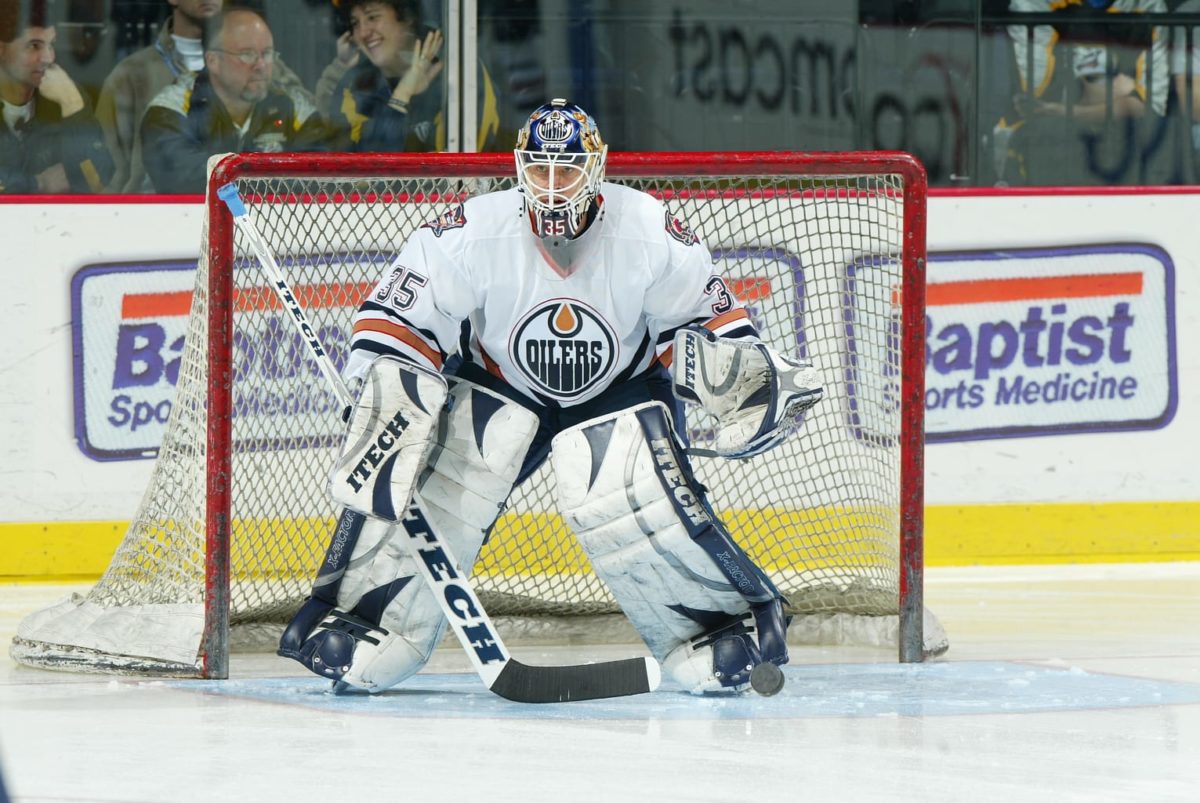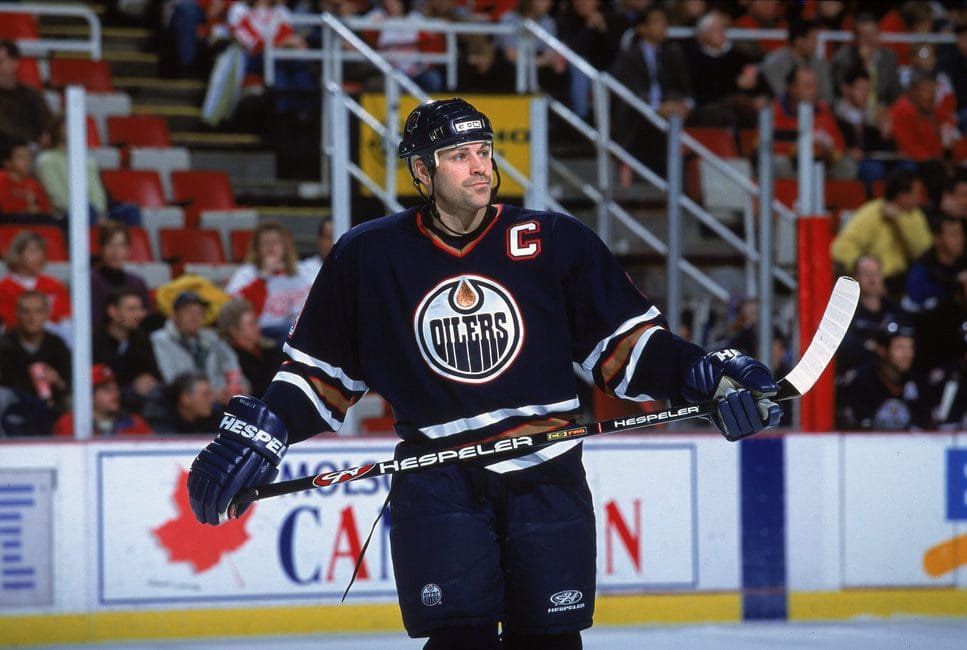Of the dozens upon dozens of postseason series that the Edmonton Oilers have played in their NHL history, their 1999 Western Conference Quarter-Finals match-up with the Dallas Stars is probably one of the least remembered.
The entire series lasted less than one week. Game 1 began just after 6:30 p.m. with the opening face-off at Reunion Arena on April 21. Game 4 ended in Edmonton on April 28 at 1:03 a.m. with Joe Nieuwednyk scoring on Tommy Salo. There was barely enough time for Edmonton to catch playoff fever.

This series probably isn’t even that clearly recalled by Dallas fans. The Stars were just beginning their postseason run and had three more series to play en route to winning the franchise’s first and only NHL championship.
It was one of the bigger mismatches in Stanley Cup Playoff history: Dallas finished the 1998-99 NHL regular season with a league-best 114 points; Edmonton had 78 points, the fewest of any team that qualified for the 1999 postseason. Dallas had set an NHL record for the fewest goals allowed in a season of 80 or more games; Edmonton had surrendered the most goals among any Western Conference playoff team.
But what it turned out to be is arguably among the most closely contested four-game sweeps ever in the long and storied history of the Stanley Cup Playoffs.
Edmonton held a third-period lead in three of the four games. The score was either tied or a one-goal margin for 97.2% of the series. At no point did either team trail by more than two goals. Dallas led for a total of 69:59, and Edmonton was ahead for 55:21. The rest of the time, 172:14 worth of gripping hockey, they were deadlocked, and it took nearly an hour of sudden-death overtime in Game 4 before the Stars could finally put the pesky Oilers away.
Any game could have gone either way, but all ended up going one way. The superior skill of Dallas was ultimately just too much against an Edmonton team that couldn’t catch a break.
But in defeat, these underdog Oilers filled fans with a unique sense of pride that can’t quite be replicated by a squad of superstars, even in victory. On its 25th anniversary, here’s a look back at the 1999 Western Conference Quarter-Finals, beginning with the backstory.
Oilers Begin Life After Joseph
After missing the NHL Playoffs for the first time in franchise history for four straight seasons, the Oilers returned to the postseason in 1997. Elite playmaker Doug Weight led a talented young nucleus, which was backed up by superstar goalie Curtis Joseph.
Edmonton shocked Dallas in the 1997 Western Conference Quarter-Finals and the Colorado Avalanche the following year. But in the 1998 offseason, the Oilers were dealt a massive, if not unexpected, blow when Joseph left Edmonton as a free agent.
Heading into the 1998-99 season, the once-auspicious Oilers were no longer even a safe bet to make the playoffs. Of 27 NHL teams, the Oilers were tied for the 20th longest preseason Stanley Cup odds.
Oilers Rally to Make Playoffs
Despite the departure of Joseph and a knee injury that sidelined Weight for 34 games, the Oilers managed to keep their heads above water for much of the 1998-99 season. But as the trade deadline grew near, Edmonton lost five straight games and suddenly found themselves on the outside of the playoff picture. That’s when general manager Glen Sather went to work.

On March 20, he sent winger Mats Lindgren and an eighth-round pick to the New York Islanders for goaltender Salo. That same day, he shipped defenceman Boris Mironov, forward Dean McAmmond, and prospect Jonas Elofsson to the Chicago Blackhawks in exchange for center Chad Kilger, wingers Daniel Cleary and Ethan Moreau, and blueliner Christian Laflamme. Then, on March 23, Sather dealt two draft picks to the Toronto Maple Leafs for defenceman Jason Smith.
With the exception of Cleary, every new acquisition was immediately inserted into Edmonton’s lineup, and the collective impact was tremendous. Edmonton had an 8-4-2 record over the last month of the season and finished its schedule with a 5-0-1 run to overtake the Calgary Flames for the final playoff spot in the Western Conference.
Game 1: Dallas 2, Oilers 1
Despite firing only eight shots on Stars goaltender Ed Belfour in the first two periods of Game 1, the Oilers were 20 minutes from winning the series opener at Reunion Arena.
Rem Murray had given Edmonton a 1-0 lead through two periods after lifting a backhander over Belfour with just 1:06 remaining in the middle frame. Making his NHL playoff debut, Salo was brilliant, turning aside all 18 Stars shots through 40 minutes, including 15 in the second period alone.
But Dallas kept coming and broke through on the first shift of the third period when Jere Lehtinen scored just 13 seconds after the opening faceoff. The Stars kept up the pressure, and with less than seven minutes remaining, Guy Carboneau scored to give Dallas the lead.
The Stars clamped down on Edmonton, giving little opportunity for the Oilers to score the tying goal as the clock ticked down. Edmonton managed to put the puck on Belfour just five times in the third period, and the final shot tally ended 31-13 in favor of Dallas, as Edmonton set a franchise-record low for shots on goal in a playoff game.
Game 2: Stars 3, Oilers 2
Dallas got on the board a lot earlier in Game 2, with Carboneau scoring just 2:34 into the first period to give the Stars an early 1-0 lead at Reunion Arena.
From there, the Oilers would spend nearly two and a half periods pressing for the equalizer. They finally got it at 8:32 of the third period, when Mike Grier scored on Belfour.
Related: Edmonton Oilers’ Forgotten Greats: Mike Grier
But before the Oilers could breathe a sigh of relief, they found themselves in chase mode again. Lehtinen scored his second goal of the series at 10:20, and Dallas winger Jamie Langenbrunner scored just over four minutes later. Suddenly, Dallas was up by two.
Weight got one back for Edmonton, scoring with 3:11 left in the third period to cut the Stars’ lead in half, but the Oilers couldn’t find another goal before time ran out.
Game 3: Stars 3, Oilers 2
Back home for Game 3, the Oilers came out like a house afire, taking a 1-0 lead when on Ryan Smyth’s power-play goal at 15:25 of the first period. After a scoreless middle frame, Smyth again scored on the power play just 24 seconds into the third period to put Edmonton ahead 2-0.
But the lead could have been bigger. Edmonton twice had a goal called back earlier in the game, and the two disallowed goals would be the difference.
After Smyth scored his second goal, Dallas began its comeback. At 6:15 of the period, Mike Keane got the Stars on the board. Just over four minutes later, Mike Mondano tied the game up. And with 7:28 remaining, Nieuwendyk gave Dallas the lead.
With three goals in 6:17 seconds, the Stars had sucked the life out of Skyreach Centre. The home team couldn’t recover and was left to wonder what could have been after suffering a third consecutive loss.
Game 4: Stars 3, Oilers 2 (3OT)
Despite the heartbreak of the previous game, Skyreach Centre was rocking for Game 4. Wayne Gretzky, who only nine days earlier had retired from the NHL after playing his last game as a member of the New York Rangers, returned to the city where he had won four Stanley Cup championships and received a thunderous ovation when he stepped out for the ceremonial opening faceoff.
Smyth opened the scoring with his third goal of the series at 4:47 of the second period. Dallas got a late goal from Nieuwendyk in the final minute of the middle stanza to tie the game at 1-1 at the second intermission.
Once again, Edmonton took the lead when Marchant scored at 6:33 of the third period. But Edmonton’s lead lasted less than four minutes before Langenbrunner tallied a Dallas power-play to make the score 2-2. Before long, the teams were headed to overtime.
The first period of extra time solved nothing. The teams played another 20 minutes of sudden death and still remained deadlocked. It was well after midnight in Edmonton when the puck dropped to begin a third period of sudden death.
Finally, with only 2:26 remaining in the third overtime, Stars defenceman Sergei Zubov fired the puck through a crowd in front of the Edmonton net, where it deflected off Nieuwendyk’s leg and past Salo.
Skyreach Centre fell silent, heartbreak compounded by exhaustion. The teams had played 117 minutes and 34 seconds of hockey, at that time the 12th longest game in Stanley Cup Playoff history and the longest game in either franchise’s history.
After a few moments, the crowd began chanting Salo’s name in appreciation of his franchise-record 53-save effort. The goaltender, who hadn’t even been in Edmonton for six weeks, was being embraced by his new town.
Edmonton and Dallas would continue to meet in the first round of the playoffs in 2000, 2001, and 2003. Each time, the Oilers put up a greater fight than the previous time, but they could never get past the Dallas roadblock. The Stars won five games in 2000 and six games in both 2001 and 2003.
Edmonton’s players acquired around the 1999 trade deadline would go on to become pillars of the Oilers. Salo spent parts of six seasons in Edmonton, received two All-Star Game selections, and became the franchise’s all-time shutout leader. Moreau and Smith would go on to become Oilers captains, the former for three seasons and the latter for six years, including 2006, when the Oilers went on a run to Game 7 of the Stanley Cup Final.
A quarter of a century later, it’s a different time in Edmonton. Expectations are sky-high, and most will consider it a great disappointment if the Oilers don’t go on an extended run this spring. But by thinking about how much it would have meant for the Oilers to win even just one playoff game in 1999, Edmonton fans in 2024 can have a better appreciation for savoring each triumph of their favorite team.
